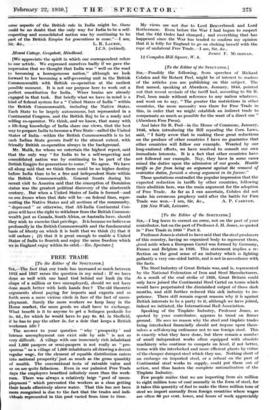FREE TRADE
[To the Editor of the SPECTATOR] ,
Sta,—The fact that our trade has in_ reased so much between 1918 and 1927 raises the question in my mind : If we have done so well with one hand tied behind our back (in the shape of a million or two unemployed), should we not have done much better with both hands free? The old theoretic arguments about paying for imports and exports and so forth seem a mere vicious circle in face of the fact of unem- ployment. Surely the more workers we keep busy in the Home market, the more goods we shall have to exchange. What benefit is it to anyone to get a Solingen penknife for 3s. 6d., for which he would have to pay 8s. 6d. in Sheffield, if he has to pay the other 5s. for a dole that keeps a British workman- idle ?
The answer to your question " why ' prosperity' and intense unemployment can exist side by side " is not so very difficult. A village with one immensely rich inhabitant and 1,000 paupers or semi-paupers is not really so " pro- sperous" as a village of 1,000 inhabitants all drawing a decent regular wage, for the element of equable distribution enters into national prosperity' just as much as the gross quantity of wealth. The conventional tests of rateable value and so on are quite fallacious. Even in our palmiest Free Trade days the employers benefited infinitely more than the work- men. There was always a relatively large "pool of unem- ployment " which prevented the workers as a class getting their heads effectively above water. That this has not been more recognized is due to the fact that the trades and indi- viduals represented in this pool varied from time to time.
My views are not duC to Lord Beaverbrook and Lord Rothermere. Even before the War I had begun to suspect that the Old Order had 'changed ; and everything that has happened since- the War has tended to confirm my opinion, that it is folly for England to go on choking herself with the, rope of unilateral Free Trade.—I am, Sir, &c.,
12 Catnpden Hill Square, W. 8. JAMES F. MUIRREAD.










































 Previous page
Previous page